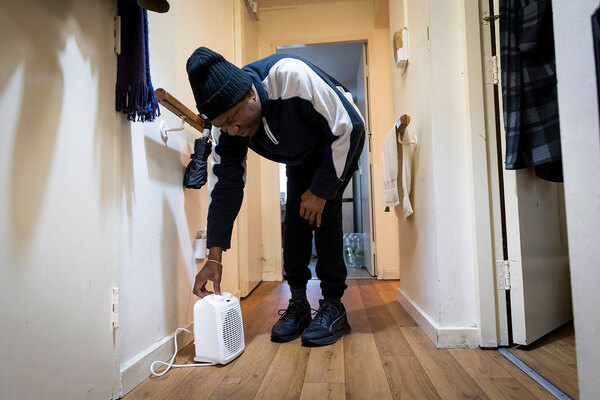You are viewing 1 of your 1 free articles
Dispatches from Housing 2023: day two
A daily round-up of the most important headlines from day two of the Housing 2023 conference. Photography by Guzelian
Day two dawned on Manchester and the talk in the air at the conference was what Lisa Nandy, shadow housing secretary, would say in her keynote address to start the day.
Delegates were heard to observe that it was the first time in years that Labour’s policy position actually mattered, given the polling that suggests they are on an unstoppable path to power in 2024.
So will we see a change in social housing policy? At a packed-out breakfast briefing at 8am, the feeling was that the party would not be particularly ambitious.
“I’m not expecting any great changes,” one delegate said.
“The problem is they aren’t going to spend any money,” said another.
The feeling was that rather than Ms Nandy, the person who needs converting to the cause of social housing is shadow chancellor Rachel Reeves, whose commitment to ‘fiscal discipline’ may prove to stand in the way of hopes of major investment in new social housing.
Delegates did not need to wait long to find out more, with Ms Nandy taking to the stage moments after 9am to share her thoughts.
Read on to find out what she had to say – and the rest of the day’s key talking points.
Nandy, you came and you gave us your previously announced policy lines
Extracts from Ms Nandy’s speech were pre-released last night – and they indicated that she would stick largely to the script Labour has been following in recent months: a return of housebuilding targets, a review of green belt land to find developable sites, a mortgage guarantee scheme and first dibs for first-time buyers.
There is nothing much wrong with any of these policies, but from a social housing perspective they are fairly underwhelming. More supply is good, but hard to guarantee in the current climate and no guarantee whatsoever of adequate amounts of social and affordable housing.
More surprising was the shadow housing secretary’s willingness to shoot down regional mayors such as Andy Burnham and Sadiq Khan who have called for powers to control rents – as well as ruling out mortgage relief.
“Targeted mortgage relief that fuels the inflation crisis is no substitute for stabilising the economy and getting interest rates under control,” she said.
“And when housebuilding is falling off a cliff and buy-to-let landlords are leaving the market, rent controls that cut rents for some will almost certainly leave others homeless.
“It might be politically easy to put a sticking plaster on our deep-seated problems. But if it’s cowardice that got us here, it is never going to get us out.”
What about social housing then? Her speech did commit to more social housing, saying: “There is no solution to the housing crisis that does not involve a substantial programme of social and affordable housebuilding.”
But details were light, with Ms Nandy saying the party will “say more about our plans for social housing in the coming months”.
References to “private patient capital ready to be unleashed” suggest that the party may be hoping to achieve this without much public money. But it may find that this model has already been tested to destruction.
Other important issues for the sector were raised in the Q&A. Ms Nandy was asked if the party would suspend the Right to Buy. She gave an unequivocal no, saying that it supports a policy which allows people access to “wealth ownership”, but that Labour would do more to ensure homes sold off are replaced.
And asked whether the party would commit to a new rent settlement, she said Labour shares the current government’s aim to keep rents low, but added: “What we won’t do is pretend that there isn’t a major funding issue for the things that we’re asking social landlords to do, and we’re committed to working with housing associations and councils in order to try and find creative ways to reverse this.”
Again, some may argue that a lack of creativity is not the key problem.
TSMs should not be superficial, says Kate Dodsworth

After Ms Nandy, there was a full house to hear Kate Dodsworth, director of consumer regulation at the Regulator of Social Housing (RSH), discuss tenant satisfaction measures (TSMs).
She said the process will be heavily focused on making sure TSM data collection involved meaningful resident engagement. “We can see whether the resident engagement system is a shiny superficial thing at the top level or whether there is real influence and tenants are being heard,” she said.
Ms Dodsworth said that the regulator “understands that actually on its own, the tenant satisfaction measures could be a blunt tool”, so it will be checking scrutiny documents and interviewing tenants to supplement the TSM data, and checking to make sure data collection and engagement reaches “all their tenants, not just the engaged”.
Jonathan Cox, director of data and business intelligence at Housemark, emphasised that landlords should not get obsessed with the numbers but should see the TSMs as an opportunity to find out more: “The regulation wasn’t so that you could tick a checkbox, the regulation was to get you to focus minds on the service improvements.”
Mr Cox told Inside Housing that he anticipates there will be an “argy-bargy” when the initial scores come out, but he hopes it will settle down.
An audience member raised the concern of the extra workload this will add to existing staff members to process and analyse the data, to nods of agreement from the packed audience.
Mr Cox said that Housemark is seeing a growth in recruitment for specialist customer experience and specialist data roles, particularly driven by larger landlords, while Ms Dodsworth said the regulator is concerned about hiring and shortages among candidates with specialist skills.
The multi-faceted crisis facing asylum seekers…
An emotional session as Syrian dentist Dr Eiad Zinah shared his 10-year journey to settling in the UK, including the perilous journey on a boat packed with 400 people, discrimination as he tried to find work, and sleeping rough as he struggled to find a landlord who would accept him in London, even with refugee approval.
“No one wants to take unsafe routes,” he said. “Why do we have to take so many risks – one of which was finding accommodation in England?”
Jennie Corbett, principal for asylum and migration at the Greater Manchester Combined Authority, said that perhaps the so-called “refugee crisis” is really a combination of other crises of public services: “It’s a housing crisis. It’s a cost of living crisis, a crisis of affordable rents. It’s the asylum backlog crisis,” she said.
“What we need to do is start mainstreaming these concerns and making sure that all of our mainstream services are asylum and migrant literate.”
…and homeless people
Meanwhile on the Fringe stage, the panel debated whether the increasing focus on tenant satisfaction could be undermining the sector’s commitment to tackling homelessness.
Jo Richardson, former president of the Chartered Institute of Housing, said that the sector should be doing more to challenge housing associations on the numbers of nominations through homelessness channels, which might be “an uncomfortable challenge”.
She also questioned whether the business approach to social housing might be “blurring the boundaries” of the sector’s social mission.
But the panel agreed that the debate should not be allowed to distract from the demand for more government funding, to allow for both the building of more stock and the improvement of current provision.
“What we need is that political leadership from government, matched by funding,” said Callum Chomczuk, director of CIH Scotland.
“We have to be absolutely clear that there’s a trade-off here unless we are supported by government to deliver on it.”
Are we forgetting about gas safety?

Appearing later in the day was Ms Dodsworth’s colleague Fiona MacGregor, who expressed concern that in the current focus on damp and mould, providers are forgetting about gas.
“We thought gas safety had been cracked. We’d had very few cases of breaches of gas safety requirements – and we’ve had some recently,” she said.
“That’s why we put the damp and mould in a context. It’s not ‘you chase one ball, and forget what is going on on the pitch elsewhere’.”
She was followed by Richard Blakeway, the housing ombudsman, who has been shaking up the sector recently with his no-nonsense approach to describing failure.
He warned that “knowledge is too often avoidably lost” during mergers or stock transfers between housing associations.
“I too often see committed housing professionals let down by systems and data,” he said. “It’s vital that those dedicated professionals stay in the sector, but there’s a real risk that they leave unless this is addressed.”
Corporate chemistry and love at first sight

Day two at the conference came to a close with a discussion on what the perfect marriage looks like when your organisation is looking to set up a joint venture.
The panellists agreed that it does not have to be love at first sight but there do have to be a number of things each organisation has in common, especially when it comes to culture and values.
Fiona Fletcher-Smith, chief executive at L&Q and incoming chair of the G15, described her experience of a good partnership recently where “the honeymoon just continues”.
But she said there are other partnerships were you meet and hug, and the other organisations are really keen, but sometimes she thinks “I’m sorry, you’re making my skin crawl, get off of me”.
Ms Fletcher-Smith added: “It’s about corporate chemistry. But if it’s not working on day one, and you feel uncomfortable about it, don’t flog a dead horse as you’re going to fail quickly.”
We will be back tomorrow with more conference news – including an appearance from housing minister Rachel Maclean.
Sign up for our Week in Housing newsletter
Already have an account? Click here to manage your newsletters













